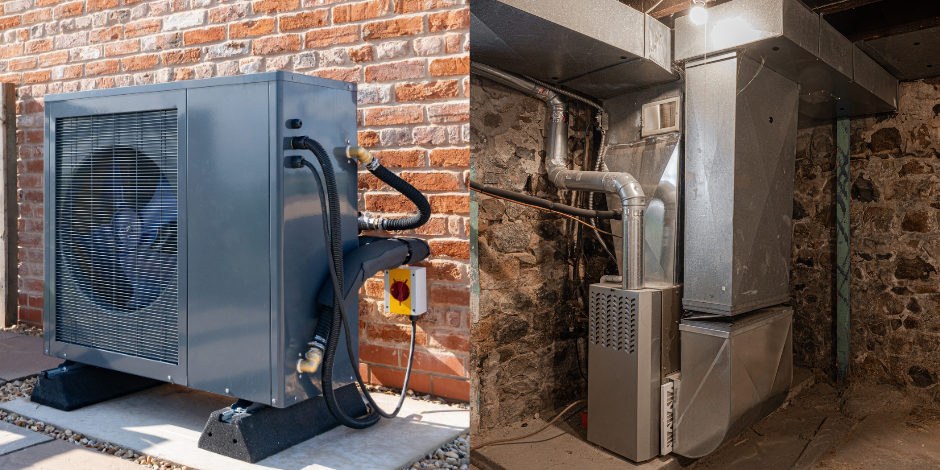
The temperatures are dropping and winter is right around the corner. If you’re in the market for a heating system replacement for the upcoming season, you’ve probably noticed that there are a wide variety of options available. In particular, mini split heat pumps have taken a hold on the heating and cooling industry—but can they help keep you comfortable in the frigid winters we see in Rhode Island?
At CARJON, we want you to make an informed decision on your heating system upgrade. This guide will compare mini splits vs. traditional furnaces to help you choose the best option for your home’s unique heating needs.
Mini Splits vs. Traditional Furnaces
Mini Split Heat Pumps
Also referred to as ductless heat pumps, mini splits offer electric-powered heating and cooling by moving heat in or out of your home. Since mini splits don’t create heat like most heating systems, but rather move it around, they are much more efficient than a traditional furnace. Plus, they don’t require any ductwork so you can easily install them anywhere throughout your home.
Mini splits consist of an outdoor unit that circulates refrigerant to absorb or release heat and multiple indoor units, known as air handlers, in different zones of your home. Many homeowners question how well a ductless heat pump can keep your home comfortable throughout the colder months. At CARJON, we install Mitsubishi Electric heating and cooling systems, which can efficiently provide heat in temperatures as low as -13°F!
Pros & Cons of Mini Splits
Take a look at just some of the benefits of mini split heat pumps as well as their cons:
Pros:
- Efficient - According to ENERGY STAR, certified mini splits use up to 60% less energy than an electric radiator. Plus, a leaky duct system can lose up to 30% of the heated or cooled air distributed throughout your home, giving ductless systems superior efficiency.
- Effective heating & cooling - Mini splits offer both heating and cooling, meaning you’ll only have one system to maintain for year-round comfort.
- Individual controls - With a ductless heat pump, each zone has its own air handler and temperature controls. This means you can heat or cool the rooms you’re using without the need to condition your entire home.
- Eligible for incentives - Since ductless heat pumps are so efficient and better for the environment, many are eligible for several rebates and tax credits.
Cons:
- Potentially higher cost - Without incentives, the upfront cost of installing a mini split system in your home can be more expensive than a traditional furnace.
- Electrical requirements - Mini splits run on electricity and some homeowners may need to upgrade their electrical service to compensate.
- Aesthetics - Ductless heat pumps require air handlers in each zone, which are usually installed on the wall. While this isn’t an issue for most homeowners once installed, it can be unappealing to some.
Traditional Furnace
Furnaces come in a wide variety of options and are the most common way to heat a home. A traditional furnace generates heat, usually by burning fuel like oil, natural gas, or propane, and connects to a home’s central duct system to deliver heated air. Furnaces consist of four major components: burners to generate heat, heat exchangers to enable heat transfer, a blower to distribute heat, and a flue that acts as an exhaust for fumes and carbon monoxide.
Pros & Cons of Traditional Furnaces
Take a look at the pros and cons of a traditional furnace:
Pros:
- Effective heating - Traditional furnaces have been the choice for heating a home for so long because they do their job well.
- Lower cost - Since furnaces have been around for much longer than mini splits, they are generally lower cost. However, while high-efficiency models are eligible for incentives, they are usually much less than incentives for mini splits.
- Widely available - Furnaces are common, meaning they are accessible and most HVAC technicians can work on them.
Cons:
- Efficiency - Even though today’s high-efficiency furnaces provide more energy savings than their older counterparts, a traditional furnace may still be less efficient than a heat pump depending on several factors.
- Heating only - Furnaces can only provide heat, which means you’ll also need to install an air conditioner to keep cool throughout the summer.
- Safety concerns - Fossil fuel combustion creates dangerous chemicals that can create a safety and health hazard in your home if not maintained, inspected, or installed properly.
Find the Right Heating System with CARJON
We’ve been helping Rhode Island homeowners with their heating and cooling needs since 1989 and our expert technicians are trained on all makes and models of both mini split heat pumps and traditional furnaces. When it comes to finding the best heating system for your home’s unique heating needs, you can trust CARJON. Our extensive HVAC knowledge can not only help improve your home comfort, but we can also help lower your heating cost.
Don’t forget to sign up for one of our Maintenance Agreements after your new heating system is installed to extend its lifespan and get peace of mind! We offer a plan for any budget that includes tune-ups, discounts on repairs, and more!



